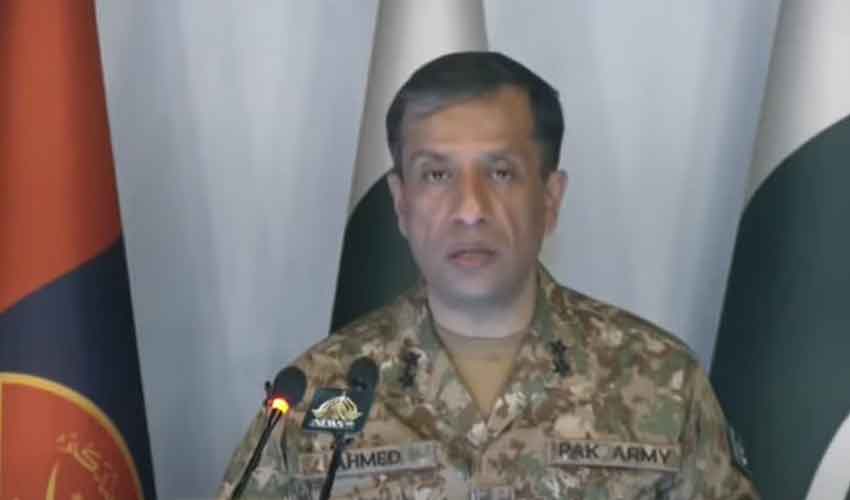The recent press conference held by Lieutenant General Ahmed Sharif Chaudhry, the Director-General (DG) of Inter-Services Public Relations (ISPR), on Youm-e-Istehsal was a significant event in the context of Pakistan's current affairs. Considering the ongoing challenges and heightened emotions in the country, the DG ISPR's address was timely and necessary.
It provided an opportunity to clarify the military's perspective on various issues, including Counter Terrorism Operation, Yom-e-Istehsal Kashmir, Why Army involved in Socio-Economic Development, Negotiations with PTI, Illegal Spectrum in the presence of Fencing and LEAs presence, Internal Accountability in Army, BYC Protests, and Anti Army campaign in foreign Media, Moreover, the press conference allowed for open dialogue with the media, which is crucial for maintaining transparency and accountability in matters of national importance.
Yom-E-Istehsal Kashmir:
Lieutenant General Ahmed Sharif Chaudhry reiterated the nation's unwavering support for the people of Kashmir in their pursuit of self-determination. Speaking from the General Headquarters in Rawalpindi, Chaudhry emphasized that resolving the Kashmir dispute according to UN resolutions and the aspirations of Kashmiris is crucial for lasting peace and stability in the region. The statement comes on the heels of Youm-e-Istehsal, a day commemorating the sacrifices made by Kashmiris in their struggle. Chaudhry paid tribute to these sacrifices and reaffirmed Pakistan's political and moral support for the Kashmiri people's fight against oppression and occupation.
Counter Terrorism Operation:
It's undeniable that Pakistan's military, intelligence agencies, and law enforcement are heavily engaged in the fight against terrorism, conducting over a hundred operations every day. This suggests a significant commitment to countering extremist violence within the country. In a briefing on counter-terrorism efforts, the military spokesperson disclosed that a staggering 23,622 intelligence-based operations (IBOs) have been conducted thus far this year. Notably, a surge of 2,045 operations within the last 15 days has resulted in the elimination of 24 terrorists. The effectiveness of these intelligence-driven initiatives underscores the military's commitment to combating terrorism through proactive measures. However, the significant number of operations and the resulting casualties also raise questions about our neighbor Afghanistan and the government IEA.
In a bold and decisive move, the Director General of Inter-Services Public Relations (DG ISPR) has declared a significant shift in terminology regarding the banned terror outfit Tehrik-i-Taliban Pakistan (TTP). By rebranding the TTP as "Fitna al-Khawarij" (the Strife of the Outcasts) and its members as "Kharji" (Outcasts), the DG ISPR is making a powerful statement that goes beyond mere semantics. This change is not simply about words; it's about exposing the true nature of the TTP. By associating them with historical figures known for their rebellion and extremism, the DG ISPR is highlighting the group's destructive tendencies. Furthermore, the use of the term "Fitna" emphasizes the chaos and discord the TTP sows, likening them to a spreading fire that threatens to consume all in its path. The TTP's violent and extremist acts are a perversion of Islamic teachings and a betrayal of the Pakistani people. By labeling them as "Kharji," the DG ISPR has declared them to be enemies of the state and outlaws in the eyes of God.
This bold move by the DG ISPR is a much-needed step in the fight against terrorism. By exposing the TTP's true nature and reclaiming the narrative, the government is taking a stand against extremism and affirming its commitment to protecting its citizens. This change in terminology is more than just words; it's a declaration of war against those who seek to destroy the peace and stability of Pakistan.
Why Army involved in Socio-Economic Development?
Some may question why a military force is involved in areas traditionally associated with civilian government. The answer lies in Pakistan's unique historical and geopolitical context. Throughout its history, the nation has faced numerous internal and external challenges, ranging from natural disasters to political instability. In many instances, the army has been the only institution with the resources and organizational capacity to respond effectively. Furthermore, Pakistan's socio-economic landscape is complex and often characterized by deep-seated inequalities. The army, with its nationwide reach and disciplined structure, has been seen as a means of ensuring that development initiatives are implemented fairly and efficiently across all regions, regardless of political or ethnic affiliations.
The army's involvement in socio-economic development goes far beyond providing security and maintaining order. It encompasses a wide range of initiatives aimed at improving the lives of ordinary Pakistanis. These initiatives include infrastructure development, education, healthcare, disaster relief, and even environmental conservation. One notable example is the army's role in the construction of the Karakoram Highway, a monumental engineering feat that connected Pakistan to China and opened new opportunities for trade and tourism. The army has also been instrumental in establishing schools and hospitals in remote areas, providing much-needed services to communities that were previously underserved.
Has the Pakistan’s army stance on May 9th changed?
The recent reaffirmation by the Director General of Inter-Services Public Relations (DG ISPR) regarding the events of May 9 has left no room for ambiguity. The military’s position remains steadfast, emphasizing that the events are significant and cannot be overlooked or forgiven. This stance, rooted in the institution’s integrity and the rule of law, presents a critical juncture for the Pakistan Tehreek-e-Insaf (PTI). PTI now faces a pivotal decision on how to proceed. The party’s strategies and narratives from 2018 to 2022, which often involved labeling political opponents as thieves and robbers, and post-2022, branding generals as Mir Jafar and Mir Sadiq, have created a polarized political landscape. These tactics, while perhaps effective in rallying support, have also sown seeds of discord and division. The unchanged stance of the Army underscores the need for PTI to reassess its approach. The call to handle members of the PTI social media team separately, especially those allegedly operating under a specific agenda and funded by foreign elements, further complicates the situation. These individuals, referred to as “Digital Terrorists,” are seen as a distinct threat that requires separate attention.
Considering these developments, PTI must carefully consider its next steps. The party’s leadership needs to evaluate whether continuing with divisive rhetoric and confrontational tactics serves the best interests of the nation. PTI stands at a crossroads. The Army’s unwavering stance on the events of May 9 is a clear signal that they are not in mood to forgive. It is a call for accountability and a more responsible political discourse. As PTI navigates this challenging terrain, it is crucial for the party to reflect on its actions and narratives, ensuring they contribute positively to Pakistan’s future.
Upholding Military Integrity: Officer Sentenced for Sedition:
The Pakistan Army has long been recognized for its robust system of internal accountability. This rigorous framework ensures officers are held to the highest standards of conduct and professionalism. The recent sentencing of retired Lieutenant Colonel Akbar Hussain to 14 years in jail for inciting sedition within the army is a commendable step in upholding discipline and safeguarding national security. This conviction, along with the earlier sentencing of two other officers on similar charges, sends a clear message that the military will not tolerate actions that undermine its integrity or threaten the stability of the nation. Moreover, the conviction of these officers underscores the importance of accountability within the pakistani military. No one, regardless of rank or former position, is above the law. This principle is essential for maintaining public trust in the military and ensuring its continued role as a respected and reliable institution.
The BYC: A Proxy for Terrorists or a Voice for Balochistan's Disenfranchised?
The DG ISPR's response to concerns about the situation in Gwadar underscores the government's confidence in maintaining law and order in the region. Addressing concerns about the perceived absence of government authority in the port city, the DG ISPR urged journalists to visit Gwadar themselves to see that the government’s writ is firmly in place.
The DG ISPR’s comments about the Baloch Yakjehti Committee (BYC) and its leadership are particularly noteworthy. He described the BYC as a proxy for terrorists and criminal mafias, accusing them of defaming law enforcement agencies (LEAs) and creating propaganda against those combating terrorism, criminal activities, and illegal operations. According to the DG ISPR, the BYC’s goal is to make development projects in Balochistan controversial.
This narrative raises important questions about the dynamics at play in Gwadar. The DG ISPR outlined a modus operandi where groups are gathered with the help of foreign investment and narratives, provoking innocent citizens, challenging the government’s authority, and engaging in disruptive activities such as stone-pelting and vandalism. When the state responds, these groups portray themselves as innocent victims, a tactic that complicates the situation further. The DG ISPR also highlighted the role of foreign agendas, suggesting that individuals with external interests often speak in favor of these groups under the guise of human rights and other concerns. This perspective was exemplified by the recent BYC protests in Gwadar, which the DG ISPR described as a spectacle orchestrated to challenge the state’s authority.
These remarks underscore the complexities of governance and development in regions like Gwadar. The interplay of local grievances, external influences, and state responses creates a challenging environment for maintaining order and progress. The DG ISPR’s statements call for a deeper understanding of these dynamics and a recognition of the broader context in which these events unfold.
The DG ISPR's press conference was a positive step towards addressing the concerns and anxieties of the Pakistani people. By providing clarity and reassurance on key issues, the military has demonstrated its commitment to transparency, accountability, and national security.



























